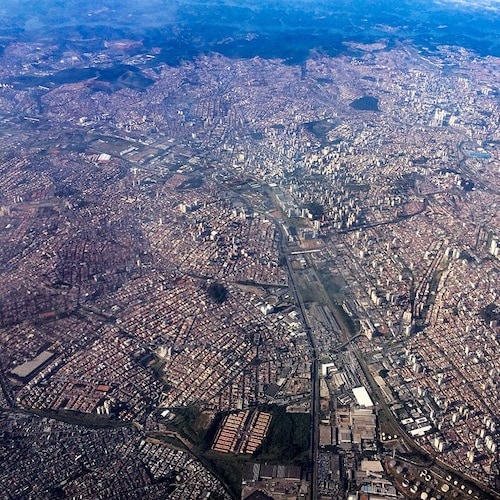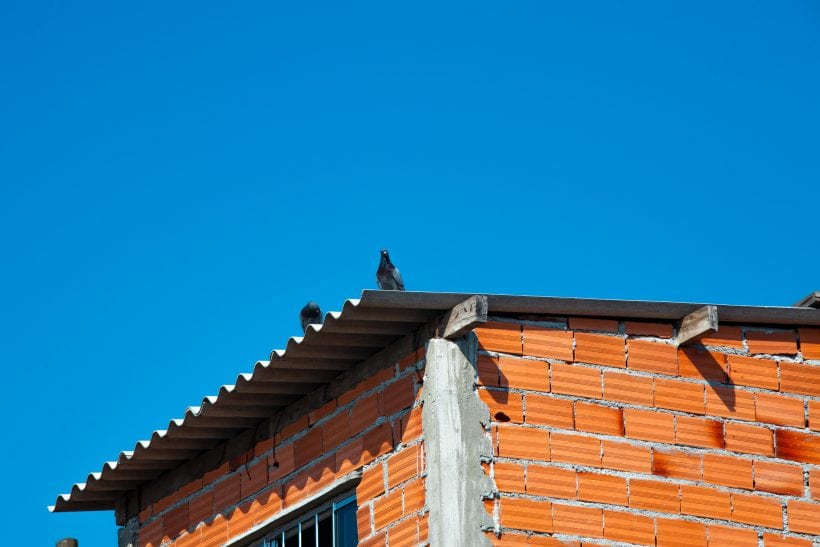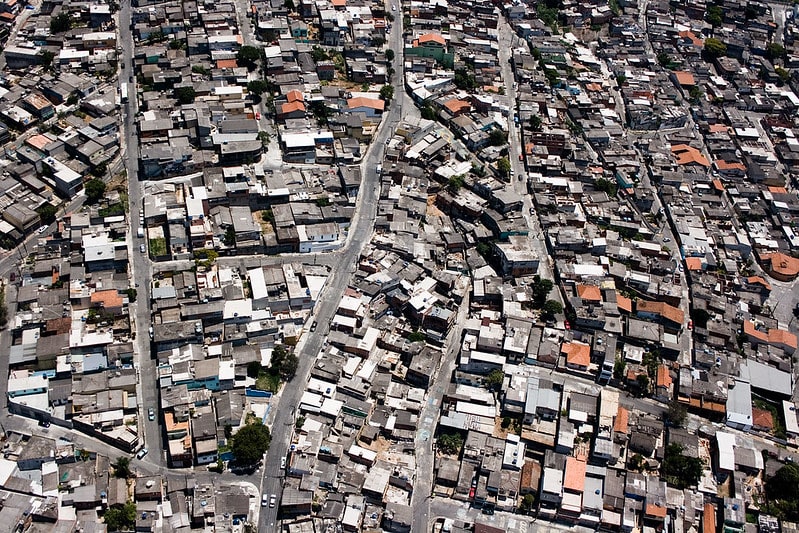Sing, O Muse, the anger of urban citizens upon whom
countless ills have been brought by the City. Many a brave soul
did the City send hurrying back to the countryside life,
and many a hero did the City condemn to a daily struggle
for the right to a citizen’s dignity.
And which of the powers of the unequal City was it
that climbed down from the lofty gated Olympus
to venture to the forgotten edges of its domain and challenge
those who must fight for a right that does not exist as a right?
It was an unfortunate official from the courts, for the City
was angry with the citizens of the urban periphery and thrust unto
them a notice of eviction, since their land was owned
by a fraudulent deed. Now the unfortunate official from the courts
had found himself at the mercy of a mob of men
who had built their homes with their own callused hands
and paid for their land in honest instalments.
Its dark tentacles continuously
wrapping around our throats, wrenching us down, ensuring we may never rise
to challenge the system the City has created for itself.
The mob augmented in size as news of the eviction burned
through the neighbourhood like unrepentant fire in a forest in drought,
with each newly engulfed branch adding strength and heat to the blaze.
Fathers joined sons who joined brothers who assembled
on the streets between the houses they had built and grown
their families within. As the crowd of incensed hearts encountered
the unfortunate official from the courts, the man ceased
his door-to-door journey and was chased
from the neighbourhood, his scattered documents
littering the dusty street like new-fallen snow.
It was on this day that the City and the great André
first fell out with one another.
When the news of the eviction notice befell André’s
piqued ears, the valiant young man was making his return
to the neighbourhood after a taxing day labouring
for his family’s bread and wine. A messenger appeared
before him on that well-trodden path.
The messenger’s familiar face creased and distorted with anguish,
breaths tumbling, as a waterfall over a cliff, from his strained breast.
The very homes that our fathers did construct with their own blood
have been given a date of demise.
“André, most noble son of Pelaio,” he spoke forcefully. “I fear
I must burden your honest heart with pieces of news
most devastating, that I must beg you to take compassion upon me.
The City has cast down a sickness upon our neighbourhood:
the sickness of injustice to which the working class is predisposed.
The City toys and entrenches these most pitiful souls in a regime devoid
of recognition of the rights inherent to all citizens,
to the security of everyday resources. Now, noble André,
the very homes that our fathers did construct with their own blood
have been given a date of demise, and that date
ticks closer with the passing of each serpentine minute. Worse still,
my friend, is the heavy news I carry of Pelaio. The principled
and bellicose gentleman was a leader of the righteous crowd that forced
an incessant City representative from our streets. But that indignant
scoundrel from the court returned soon after his expulsion with the indigo-dressed
strong arm of the City’s will, steeped in intolerance
and lust for power. Your dear father, Pelaio, was murdered
at their hands, as he fought until his last breath for the justice
that the City has stolen from us.”
André, the son of Pelaio was fuming and answered, “My father
shall not answer for the sickness that the City has inflicted upon us.
As it gazes down from Olympus and deigns to cast
its heedless eyes in our direction, as we toil under the yoke
of the system designed to perpetually hold our noses to the mud, the City sees
only land, for which it has an unrelenting and ravenous appetite. It sees not
our world of metropolitan ingenuity, where we urban citizens have laboured
endlessly to chip away our sliver in the stone of modern life — a sliver of hope
that the life of my son might be more heartening than my own. Lady Justice
shall be on our side, and law shall no longer be a humiliation reserved
for the enemies of the City; law shall be the pillar that hoists us
and our brothers from the mud to stare eye-to-eye with the throne of Olympus.”
With this, André, pounding heart black with wrath
and fire flickering in his eyes, dashed for the neighbourhood’s
main boulevard. A distressed group of fellow citizens still lingered
in the shadow of the day’s traumas.
“It is a truth,” the son of Pelaio addressed the crowd, “that a great sorrow
has befallen our neighbourhood. Surely the City would rejoice
in the murder of my father and the other valiant soldiers before him,
who have proven the sacrifice we citizens are forced to make
in order to scrape out a life in the unbridled metropolitan monster
that the City has nursed into existence. Its dark tentacles continuously
wrapping around our throats, wrenching us down, ensuring we may never rise
to challenge the system the City has created for itself. My father and
these valiant soldiers were among the most potent men
ever born upon these streets. And they have made sorely evident
that no man can stand against a king.
We must use the beast that the beast created.
And this is the reason that — as much as my heart aches
for the blood of our oppressors
to soak the soil like a monsoon rain, as they did
with my father’s — we must attack
with the law as our legitimate weapon.
‘For friends, everything; for enemies, the law.’
And I can imagine no comparable enemy to that,
the glutinous City, who continues to take
even when we have nothing left to give.”
We must use the beast that the beast created.
“I am moved by your words.” The plump silhouetted figure
of a dear comrade emerged from the attentive crowd. “And I wish
to help this brave son, who has offered himself as a representative
to the plight of these humble citizens. As a local politician, I am
known to many of you, just as I am known to the sickness that
the City has inflicted upon our precarious neighbourhood. I wish
to offer my legal services and, behind the valiant leadership of the
noble André, I wish to join my fellow man in court to remedy
the grave injustices that have transpired here and fight
for the cause for which the honourable Pelaio gave his life:
the matter of the unlawful eviction
of this prospering and established neighbourhood.”
Once an interminable number of days had passed, the moment
that the angry urban citizens had awaited finally arrived. The judge,
seated atop his lofty bench, dressed in a torrential downpour of black silk,
had heard their case. With one voice,
the urban citizens of the neighbourhood had proffered their deeds,
recounted their narratives, pled for their sliver
in the stone of modern life to be maintained.
The granite face of the judge neglected to crack
with emotion as he handed down his ruling.
The granite face of the judge neglected to crack
with emotion as he handed down his ruling, but
the words fell from his lips like drops of sweet honey.
“The citizens of this urban periphery shall not be evicted.
The court rules that the residents
have legal claim to the land that they inhabit.
The City has no power to evict them from their homes.”
André strode from the courthouse beneath a sun that he may as well
have experienced for the first time. Its gentle warmth caressed
his tired but victorious face. He thought of his father
and what the principled and bellicose man had fought for.
Pelaio had decades ago made the journey
to this metropolis in the hope that André would have
a more heartening life than he had had. With this imperishable thought
held delicately in his brain, André barely felt the bullet
as it entered his heart. The sneaky intruder of a coward and not a warrior.
He fell to his knees as the thunder of gunfire reverberated
off the white pillars of the courthouse. With the sound still ringing
in his ears, blood began to trickle upon the marble steps
like crimson rose petals lain upon the snow.
‘The only law is might.’
No man can stand against a king.
No citizen can stand against the City.
Explanatory appendix
Inspired by Homer’s Iliad, my poem offers an epic spin on James Holston’s article “Insurgent citizenship in an era of global urban peripheries”, City & Society, 21(2): 245-267 (2009). In it, Holston describes the ways in which the rapid urbanization of the 20th century has left many people living in abject poverty on urban peripheries. He explores the struggles of citizens who are often the victims of immense inequalities in systems built to benefit the rich and powerful. He discusses what “insurgent citizenship” means in the context of modern urban Säo Paulo (Brazil), and what constitutes a right.
Insurgent citizenship is grounded in all of the achievements that the urban poor have fought to accomplish, particularly in Brazil.
For Holston, the idea of “insurgent citizenship” is grounded in all of the achievements that the urban poor have fought to accomplish, particularly in Brazil, where Holston’s research took place. As people flocked to the cities and set up residences on the peripheries, they had to continue to fight to win rights that were necessary for life. They became literate so they could win political rights, they built houses to certify property claims, they campaigned for the right to have access to city infrastructure, and they became skilled at using the law to fight against evictions. All these experiences transformed the meaning of rights associated with urban citizenship and dignity. They continue to transform the relationship between citizens and the City.
One anecdote detailed by Holston in his article pertains to a neighbourhood in Säo Paulo in the 1970s that was visited one day by a court official who told the residents that they were being evicted – the result of fraudulent land deeds held by the inhabitants. The people of the neighbourhood, like most neighbourhoods on the outskirts of the city, had built their own houses through a process of “auto-construction”, and they had believed that their land deeds were genuine. After running the court official out of the neighbourhood, he came back with the police, and several people were arrested. Eventually residents were brought together by local politicians who hired a lawyer for them. Unfortunately, however, the lawyer was then murdered. One neighbourhood resident recounted the incident in Holston’s article: “at the time, it was a war, between us and the land-scammers. The law didn’t exist. The only law was might; it was violence”. The article by Holston does not describe what happened to the residents of this neighbourhood – presumably their hopes died with the lawyer – but it does talk about a court victory by a resident in a similar neighbourhood years later also concerning an eviction.
This character of the City represents the system that oppresses the urban poor while simultaneously lifting up the rich and powerful.
My poem inspires itself from these two episodes and seeks to fill the gap left in the juxtaposition of these two stories in order to personify the reality of the struggles of the citizens against a similarly personified “City”. This character of the City represents the system that oppresses the urban poor while simultaneously lifting up the rich and powerful. Many allusions are made between the City and the gods of Olympus, which is meant to signify – while also nodding again to the history of Greek epic poems – the power the system has over the people who are forced to live with it. Even when there is justice, there is still injustice. Even with small victories, the system will always continue to benefit the rich because they created it.
Featured Image: Sao Paulo from the air. Photo (cropped) by Mike Peel, as found on of WikimediaCommons (CC-BY-SA-4.0)
Pigeon and roof: Photo by Danilo Alvesd on Unsplash
Grey City: Photo by Fernando Stankuns, Aerial view of Sao Paolo. Found on Flickr (CC BY-NC-SA 2.0





